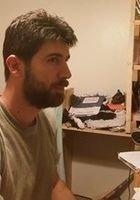Connect with hundreds of tutors like Max
Who needs tutoring?
FEATURED BY
TUTORS FROM
- YaleUniversity
- PrincetonUniversity
- StanfordUniversity
- CornellUniversity

Max
About Me
I've been helping students and friends to edit and revise their writing across multiple styles for seven years. Throughout high school, I was part of an exclusive magnet school for creative writing called the Educational Center for the Arts: in the mornings I took core classes (math, science, history, etc) at a public high school, and in the afternoons I attended college-level workshops in fiction, screenplay, memoir, humor, and poetry. There, I learned from published writers and edited fellow students' pieces, including college essays, for four years while developing my own work. In college, I became the opinion section editor of my student newspaper. Last year, I served as its editor in chief. At The Justice, I've applied the skills I learned from creative writing to journalism and op-ed content. I already had experience clarifying sentences, helping writers develop a unique written voice, and keeping writing concise and precise, but through The Justice I learned how to find and support a strong argument, recognize logical fallacies in one's own thinking as well as in others, and conduct thorough, accurate and credible research. I also learned the AP's grammatical style guides inside and out, though remain a devotee of the Oxford comma. While most of my work in tutoring specifically has been with middle and high school-age students, I've also worked with younger students as a summer camp counselor and a teaching assistant. I've also got a strong theater background, both as a performer and a viewer.
Education & Certifications
Q&A with Max
Connect with a tutor like Max
Connect with a tutor like Max
Tutors with Similar Experience


